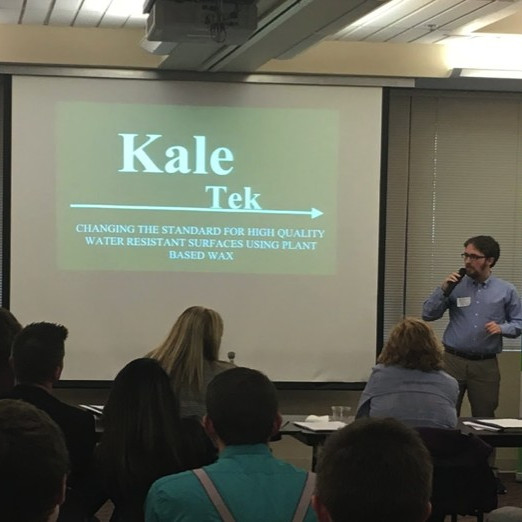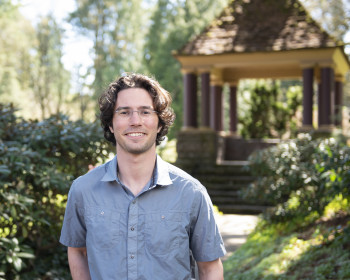Student Inventors Head to Cleantech Challenge Finals
A team of five Lewis & Clark students have qualified for the final rounds of the 2016 Cleantech Challenge. The competition, held at Portland State University, invites student entrepreneurs to showcase their inventions and compete for a $10,000 grand prize.
Open gallery

Sure, kale is the new superfood. But does the trendy green plant have other uses? For Lewis & Clark’s student innovation team Kale-Tek, the answer to that question is a resounding yes.
After participating in the initial qualifying round earlier this year, Kale-Tek was selected as one of ten semifinalist teams vying for the $10,000 grand prize at the fourth annual Portland State University Cleantech Challenge, a competition designed to showcase the work of student innovators which is open to colleges statewide for the first time this year. The Cleantech Challenge will be held September 8–9 during the Oregon BEST Fest Cleantech Conference.
Their creation is a water-resistant spray made from the waxy surface of kale leaves. Meant as a high-quality alternative to artificial sprays, the organically derived substance can be applied to clothing, wood, furniture, and machine surfaces.
Team members Jonah Svihus ’17, Emily Kelley ’16, Blake Slattengren ’18, Joshua Proto ’16 and Ian Dechow ’16 drew inspiration from their courses and lab groups. The class that sparked the project was the entrepreneurship course, Technologies of the Future, taught by Professor of Biology Kellar Autumn.
Autumn has conducted extensive research on the ability of geckos to scale seemingly unclimbable walls and ceilings. Working with student assistants, he created and patented synthetic adhesive nanostructures, (or “gecko glue,”) which mimics the properties of the sticky setae on geckos’ feet. Like the kale spray, his product has a wide variety of potential applications, from climbing supplies to medical adhesives.
Autumn’s class focused on hands-on research and the importance of merging scientific thinking with the creative process, a message which resonated with his students. That creative thinking has served Kale-Tek well, and as the coming months bring more prototype refinements the team will continue to rely on it.
Kale-Tek also attributes its early successes to supportive Lewis & Clark faculty like Amelia Wilcox, assistant professor with term of psychology and acting academic director of Lewis & Clark’s Center for Entrepreneurship . It was Wilcox who recommended the Cleantech Challenge to the group after seeing their initial idea.
“She really saw the potential in us,” said team member Joshua Proto. “It was an environmental mission for us, and with the support of our professors it all fell into place.”
“We’re getting a much better understanding of what we’re doing now, but it’s far from over,” said Proto. “It’s a little like having a child, in some ways—you have no idea what it’s going to be. We have this idea, and we don’t know what it will become, but it could be something great—how could we not go for it?”
Biochemistry and Molecular Biology
Emily Price ’18 contributed to this story.
More Newsroom Stories
Public Relations is located in McAfee on the Undergraduate Campus.
MSC: 19
email public@lclark.edu
voice 503-768-7970
Public Relations
Lewis & Clark
615 S. Palatine Hill Road MSC 19
Portland OR 97219

